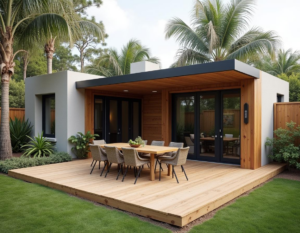As families navigate the evolving landscape of aging parents and changing living arrangements, Accessory Dwelling Units (ADUs) emerge as a transformative solution. In this blog post, we’ll explore how ADUs play a crucial role in helping parents age independently while maintaining proximity and connection with their loved ones.
- Aging in Place with Dignity: ADUs provide aging parents with the opportunity to age in place with dignity. The independence offered by a separate living space allows them to maintain a sense of autonomy and control over their living environment.
- Proximity to Loved Ones: Building an ADU on the same property as the main residence ensures that aging parents remain close to their loved ones. This proximity facilitates regular interactions, emotional support, and the convenience of being near family members.
- Safety and Accessibility: ADUs can be designed with safety and accessibility features tailored to the needs of aging individuals. This may include ramps, wider doorways, handrails, and other modifications that enhance the overall safety and ease of movement.
- Supportive Independence: While aging parents enjoy the independence of a separate living space, the proximity of an ADU allows for supportive care when needed. Family members can easily provide assistance, check on their well-being, and offer companionship while respecting their privacy.
- Flexibility in Design: ADUs offer flexibility in design, allowing families to create a living space that caters to the specific needs of aging parents. From single-story cottages to garage conversions with accessible features, the design possibilities are vast.
- Financial Benefits: Building an ADU can have financial benefits for both aging parents and homeowners. It provides an affordable living arrangement for parents, and the potential for rental income or increased property value benefits the overall financial well-being of the family.
- Reduced Social Isolation: Social isolation is a common concern for aging individuals. ADUs allow parents to maintain social connections with family members, neighbors, and the community. The sense of belonging contributes to emotional well-being.
- Shared Responsibilities: Living in close proximity allows for shared responsibilities among family members. From daily tasks to occasional errands, the support network created by ADUs ensures that aging parents have assistance when needed without sacrificing their independence.
- Transitional Care: ADUs are ideal for transitional care arrangements. As health needs change, families can adapt the living space to accommodate additional support services or medical equipment, ensuring a smooth transition without the need for relocation.
- Peace of Mind for Everyone: Perhaps the most significant benefit of ADUs in supporting aging parents is the peace of mind it brings to both parents and their adult children. Knowing that parents have a comfortable and accessible living space while remaining close fosters a sense of security and emotional well-being.
Conclusion: ADUs serve as a bridge between independence and support for aging parents, creating a living arrangement that prioritizes dignity, proximity, and flexibility. By embracing the potential of ADUs, families can navigate the challenges of aging gracefully, fostering a supportive environment that honors the autonomy and well-being of their loved ones.






